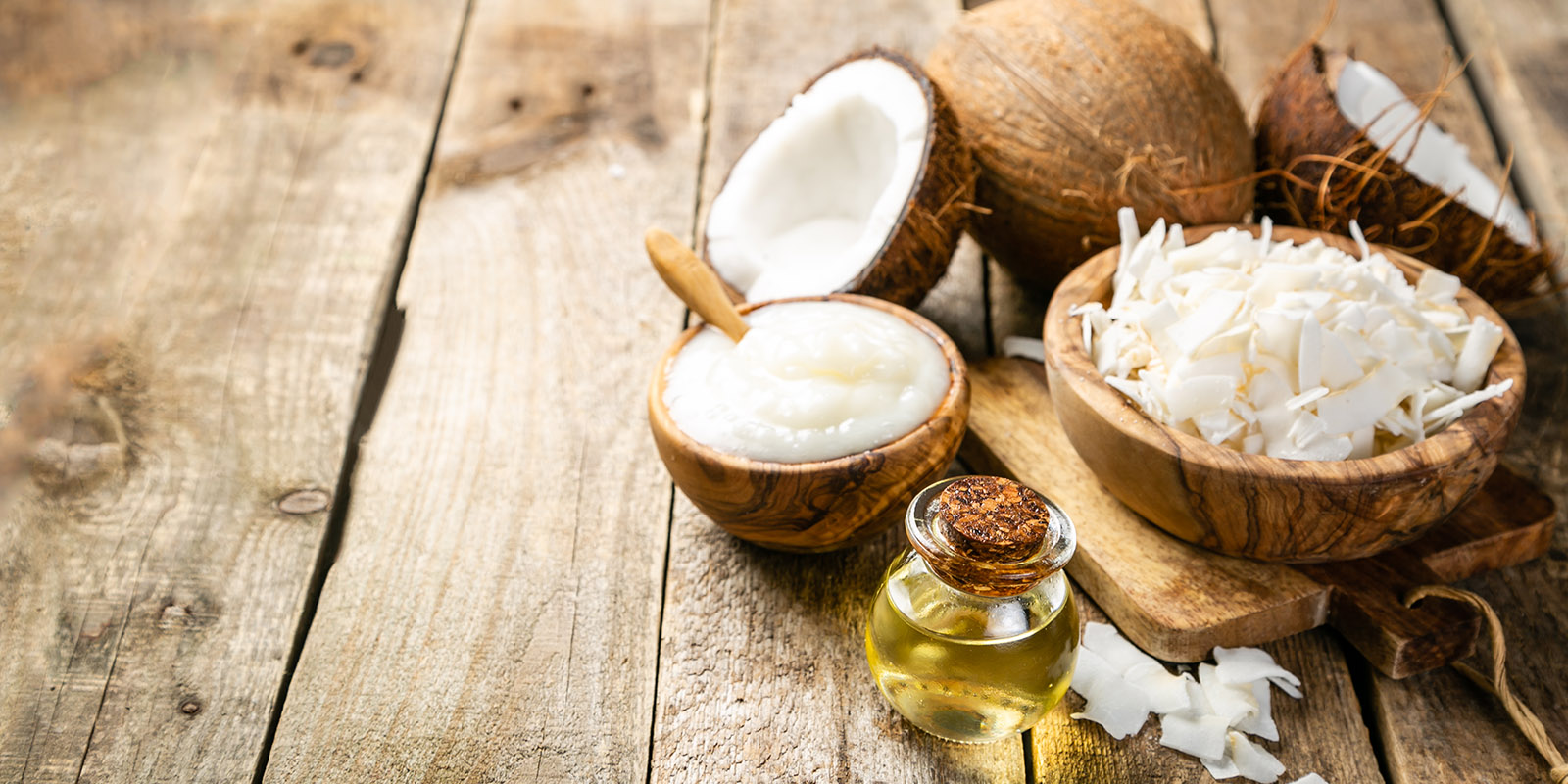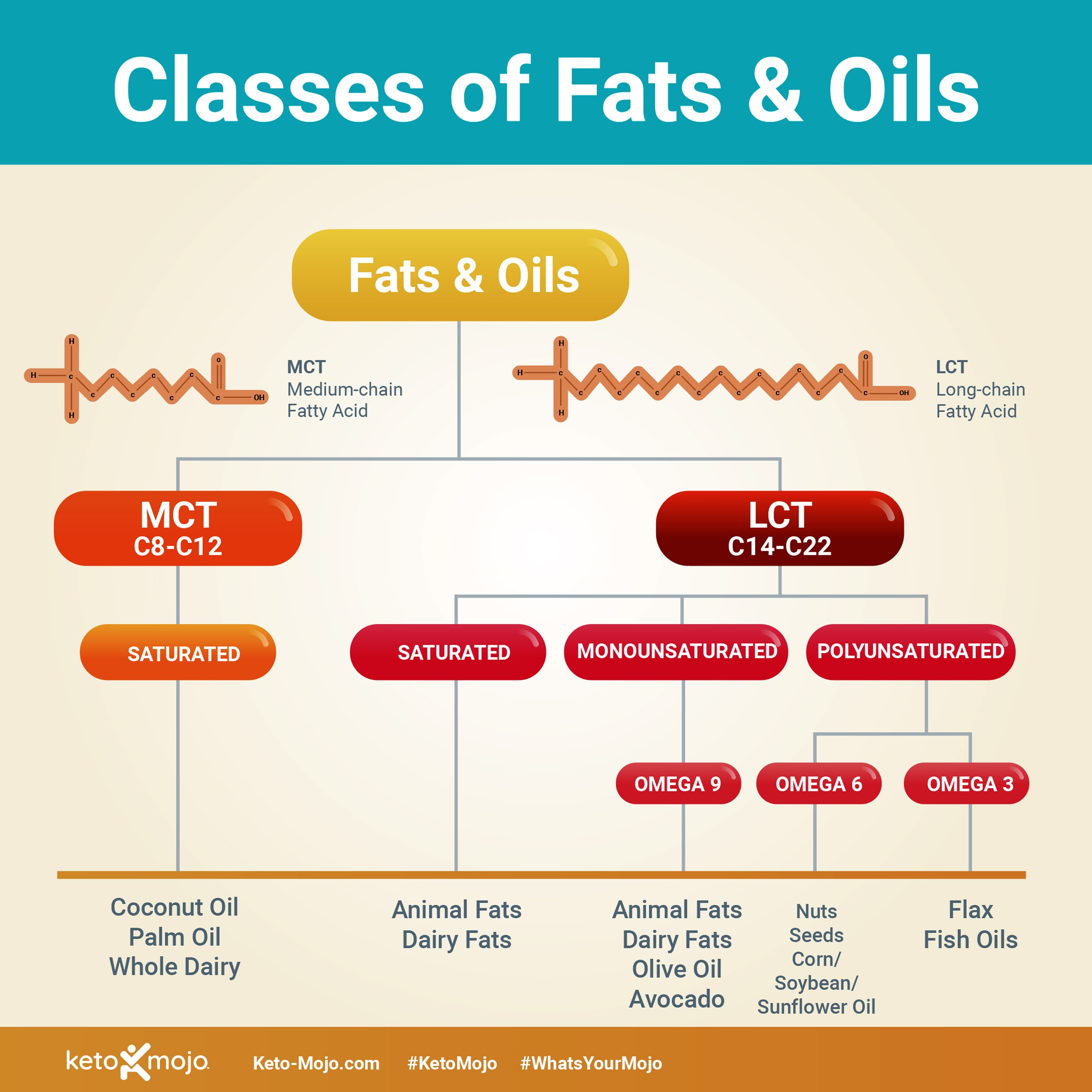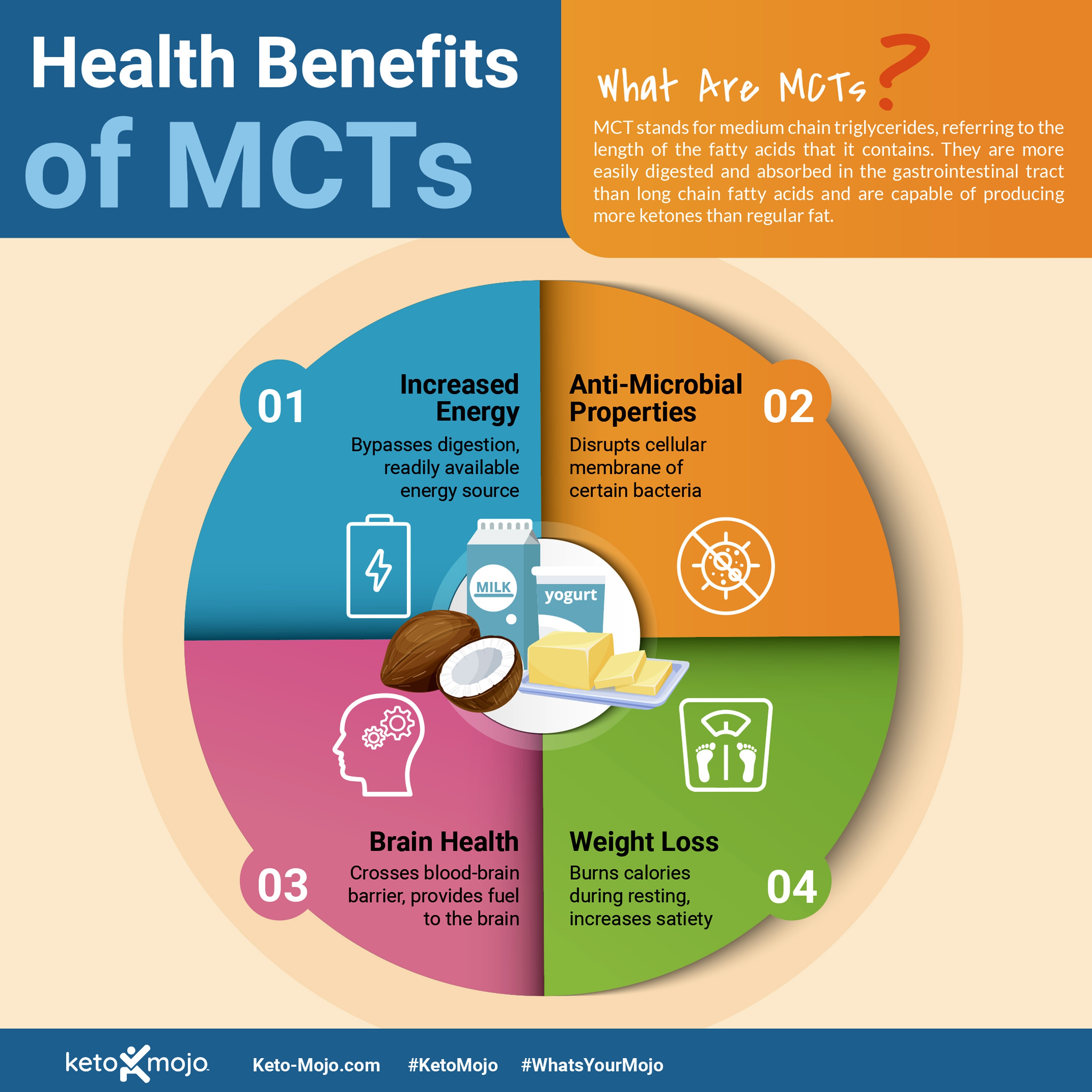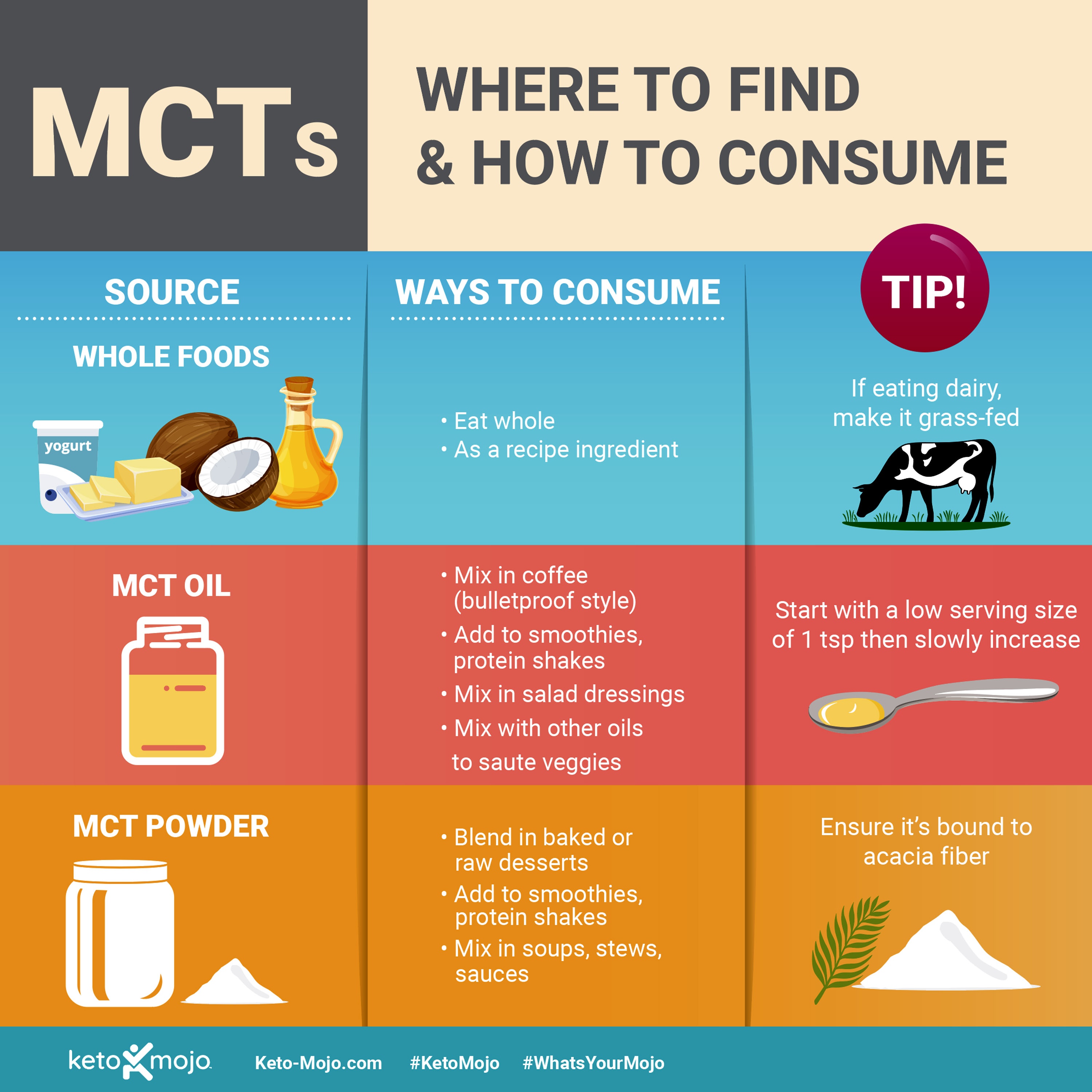Medium-chain triglycerides (MCTs) are a type of fat found in several different foods, including coconuts and dairy. Due to their unique health benefits, MCTs have been getting a lot of recognition in the health and wellness industry lately. You may have noticed more people cooking with coconut oil or putting MCT oil in their morning coffee. But why are so many people enthusiastic about this special fat?
In this article, we breakdown what MCTs are, the different types of MCTs, the benefits of consuming these fats, and how you can incorporate them into your diet.
What are MCTs?
MCTs are saturated fats that possess unique molecular characteristics that allow them to behave differently inside the body compared to other fats. As mentioned, MCT stands for medium-chain triglyceride, which denotes the length of the carbon chain of these fatty acids.
Fats are categorized by how many carbons they have attached to them. Long-chain triglycerides (LCTs) are the fats that make up most of the foods we eat and contain between 13 to 21 carbon atoms. MCTs on the other hand range from 6 to 12 carbons in length.
The medium carbon-chain length of MCTs is what gives these fats their unique characteristics. Fatty acids are digested by removing carbon atoms, thus the fewer carbon atoms a fat has, the more rapidly that fat can be digested. In the case of MCTs, this feature allows them to bypass traditional digestion and become an instant energy source following consumption.
There are four types of fats that are classified as MCTs:
- C6 caproic acid
- C8 caprylic acid
- C10 capric acid
- C12 lauric acid
The length of each MCT will alter its function, as shorter MCTs are broken down quicker than their longer counterparts. However, it’s important to mention that C6 has not been studied as thoroughly in research as C8, C10, and C12.
Benefits of MCTs & MCT Oils/Powders
There are many benefits associated with the consumption of MCT oil, the most notable being increased energy, anti-microbial, brain health, and weight loss.
Increased Energy
Most of the research-backed benefits of MCTs are a result of their rapid digestibility. Since MCTs bypass traditional digestion, they are more readily available as an energy source after consuming. This allows these fats to also be used for ketone production, the only food that is able to do so and one of the reasons why this fat is so popular on the ketogenic diet. Of the different types of MCTs, research has demonstrated that C8 may be the most effective MCT at increasing ketone production, followed by C10.
It’s important to note that C12, while technically considered an MCT, also possesses characteristics of LCTs. This means that C12 is not digested as quickly as the other MCTs and thus does not produce as big of an impact on ketone levels.
Anti-Microbial Properties
While C12 may not be as effective for increasing ketone production, this fat does have potent anti-microbial properties meaning that it can disrupt the cellular membrane of certain bacteria, preventing further growth. C12 is contained in high amounts in breast milk and is thought to help lay the foundation for gut health in nursing babies for this reason. While C8 and C10 also demonstrate some anti-microbial properties, C12 has the strongest.
Brain Health
MCTs have also been associated with improving brain function. MCTs are broken down rapidly within the body and can be easily converted into ketones by the liver. The ketones produced can cross the blood-brain barrier and provide fuel to the brain. This leads to improvements in cognitive function, especially in aging or neurodegenerative individuals due to the fact that as we age, our brain’s ability to uptake glucose decreases, and specific neurodegenerative diseases are actually characterized by decreased glucose utilization. This matters, because in these situations, ketones can provide fuel to the brain when glucose cannot.
Case in point: one study provided six patients with mild cognitive impairment 56 grams of MCTs per day for 24 weeks. The results confirmed MCTs’ ability to increase ketone production and the subjects demonstrated improvements in memory compared to the control group. This success has been further supported by studies looking at MCT consumption in individuals with Alzheimer’s disease.
Weight Loss
MCTs have also been associated with weight loss. Research has demonstrated that the unique digestion of MCTs causes the body to burn more calories through the digestion process, increasing resting energy expenditure. While this is only a slight increase, burning more calories at rest over time can lead to weight loss. Furthermore, the increase in energy available from consuming MCTs can lead to more activity and thus greater energy expenditure.
Finally, research has shown that MCTs increase satiety, likely a result of the ketones produced, making people feel fuller for longer. This can lead to calorie restriction, which, coupled with an increase in energy expenditure, is a recipe for shedding fat.
How do I consume MCTs?
MCTs can be found in whole foods like coconut oil, palm kernel oil, butter, whole milk, and full-fat yogurt. However, the composition of MCTs varies between sources. Whole-food sources contain primarily C12 or lauric acid, with less of the other MCTs. This means while coconut oil is a great addition to your diet, finding ways to add the other MCTs into your diet will provide additional benefits.
MCTs is also extracted from whole food sources, most commonly coconut and palm, to produce an MCT oil that consists primarily of C10. This MCT source has a much greater ability to increase ketone production compared to the whole food sources of MCTs listed above. MCT oil can be further broken down into oils that contain more C8 or C6, which would also allow these oils to provide greater ketone boosting effects. MCT oil can be consumed by adding it to beverages like coffee or using it in recipes, including homemade keto-friendly salad dressings.
MCT Oil Side Effects
It’s important to note that, when consumed in excess amounts by beginners, MCT oil can cause nausea, vomiting, diarrhea, and upset stomach due to its rapid absorption. For this reason, it’s recommended that if you begin consuming MCT oil, you start with very low serving sizes (around 5 to 7 grams or 1 teaspoon at a time) and assess your tolerance before increasing the dose.
MCT Oil Powder
A newer product on the market, which promises the same benefits of MCT oil with less digestive distress is MCT oil powder. MCT oil powder is created by spray-drying MCT oil and microencapsulating it with a “carrier” that allows it to become a powder form. MCT powder is typically easier on the stomach and mixes better into liquids. MCT powder is becoming more popular and is being carried more frequently in grocery stores and can be found online.
It is important to look for which carrier source is being used when purchasing MCT oil powder. Many products out there will use cheap fibers or even maltodextrin, both of which can spike blood sugar and be counterproductive for ketosis. If you are looking for the most keto-friendly MCT oil powder, look for products bound to acacia fiber.
MCT oil powder can come in unflavored or flavored forms, making it a great addition to beverages like shakes and smoothies. It’s also a great baking addition and is commonly used in keto desserts. Want to explore MCT oil powder? Check out our review of Perfect Keto’s Chocolate, Matcha, and Vanilla flavored MCT Oil Powders.
The Final Word
MCTs are unique fats that are broken down differently by the body, allowing them to provide various benefits. All four types of MCTs provide unique benefits and all make a great addition to a healthy diet, especially a ketogenic diet.
If you’re new to using MCT oil, start with a smaller serving size and increase as tolerated. Remember that whole-food sources of MCTs, like coconut oil, provide different benefits compared to MCT oil supplements, so you may want to incorporate both into your diet to get the best results.





